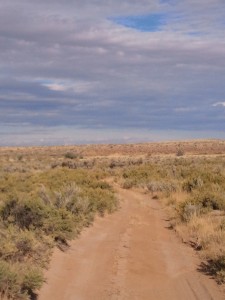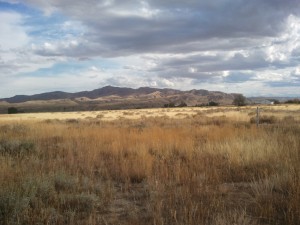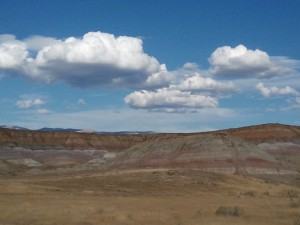 I had forgotten about the sky. Thirty years ago, on my last visit to Wyoming, I remember being overwhelmed by its endlessness, but thirty years dulls the sensations of most memories as it had mine. Now when we walked out onto the sage and grasslands, I felt both the surge of those ‘felt’ memories returning and the present intoxication of such a direct, forceful landscape. Southeastern Pennsylvania is fat and green and folds in on itself again and again and again, one valley or hollow sidling up to the next, all shrouded in rich grass or trees banked to their own wealth in large, fat, green leaves. This land is as blunt in its power as a skeleton and as architecturally pure.
I had forgotten about the sky. Thirty years ago, on my last visit to Wyoming, I remember being overwhelmed by its endlessness, but thirty years dulls the sensations of most memories as it had mine. Now when we walked out onto the sage and grasslands, I felt both the surge of those ‘felt’ memories returning and the present intoxication of such a direct, forceful landscape. Southeastern Pennsylvania is fat and green and folds in on itself again and again and again, one valley or hollow sidling up to the next, all shrouded in rich grass or trees banked to their own wealth in large, fat, green leaves. This land is as blunt in its power as a skeleton and as architecturally pure.
The horizon out here presents a more pleasing line to the eye than the sea. Here the eye can leap from a single aspen tree to a gulch, to a rise, to a bluff, to a series of bluffs, to a far plain, golden and hinting of shadows, to a mountain range far far in the blue distance, the mountains a slightly darker blue than the sky above. You know that if you walked to that rise there would be no end to this unrolling land. There would only be more variations of beauty. How would such inescapable beauty, daily beauty, change you?
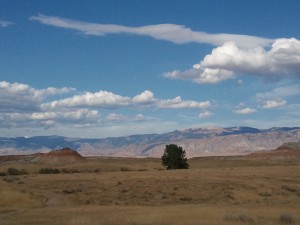 West of Shell, on our way to Cody, we left the road and hiked in on range land for two miles looking for wild horses. Horned Larks flew in flocks around us, rising up and settling down in the sage brush. We scared Pronghorn herds who darted away from us to a safe distance and then stopped and watched us as we watched them. We found the horses, a group of a dozen or so, handsome, some black, some brindled, wary of us, standing with their noses into the wind. These are the moments we unspool in our mind’s eyes on our deathbeds and cause those gathered around us to wonder why we are smiling.
West of Shell, on our way to Cody, we left the road and hiked in on range land for two miles looking for wild horses. Horned Larks flew in flocks around us, rising up and settling down in the sage brush. We scared Pronghorn herds who darted away from us to a safe distance and then stopped and watched us as we watched them. We found the horses, a group of a dozen or so, handsome, some black, some brindled, wary of us, standing with their noses into the wind. These are the moments we unspool in our mind’s eyes on our deathbeds and cause those gathered around us to wonder why we are smiling.
I kept trying to figure out how the easterner’s eye, my eye, makes sense of all this emptiness and sky. I would bet that it gets inside you, and that after a time of living in it, under it, enfolded by it, you would change, perhaps become quieter, perhaps become more aware of how you cannot dominate it but only live with it. It is a hard landscape, and I think its edges and rawness give it the power to seduce.
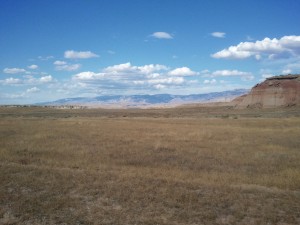 At Red Gulch we drove far off road to a dinosaur track site, and than walked the two foot strides of theropods who left their tracks on the edge of the Sundance Sea 166 million years ago. Sometimes I felt ready to disappear either into time’s vastness or into the span of blue around me. I walked back to the car and leaning against it looked out at uninterrupted nature — no road, no plane’s contrails, no roadway sound, no telephone poles, nothing except the land cresting and falling for over one hundred miles. I thought of a moment from Michael Sharra’s novel The Killer Angels. John Buford, a Union Cavalry commander has come into Gettysburg before any other soldiers. He must prepare to fight, but he is older and tired of war. For a moment a reverie takes hold of him:
At Red Gulch we drove far off road to a dinosaur track site, and than walked the two foot strides of theropods who left their tracks on the edge of the Sundance Sea 166 million years ago. Sometimes I felt ready to disappear either into time’s vastness or into the span of blue around me. I walked back to the car and leaning against it looked out at uninterrupted nature — no road, no plane’s contrails, no roadway sound, no telephone poles, nothing except the land cresting and falling for over one hundred miles. I thought of a moment from Michael Sharra’s novel The Killer Angels. John Buford, a Union Cavalry commander has come into Gettysburg before any other soldiers. He must prepare to fight, but he is older and tired of war. For a moment a reverie takes hold of him:
“Buford rode back to the Seminary. He made his headquarters there. In the morning he would have a good view from the cupola. He dismounted and sat down to rest. It was very quiet. He closed his eyes and he could see the fields of snow, miles and miles of Wyoming snow, and white mountains in the distance, all clean and incredibly still, and no man anywhere and no motion (49-51).”
I wish I had another life to live in the tough grandeur of this land, in this clear light.
